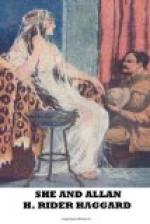We stared at each other and at them, and then Goroko said that he would like to inspect the bodies to learn whether lightning killed at Kor as it did elsewhere, also whether it had smitten them altogether or leapt from man to man. This, as a professional “Heaven-herd,” he declared he could tell from the marks upon these unfortunates.
As I was curious also and wanted to make a few observations, I consented. So with the exception of the wounded men, who I thought should avoid the exertion, we scrambled down the debris of the tumbled wall and across the open space beyond, reaching the scene of the tragedy without meeting or seeing anyone.
There lay the dead, eleven of them, in an exact line as they had stood. They were all upon their backs with widely-opened eyes and an expression of great fear frozen upon their faces. Some of these I recognised, as did Umslopogaas and Hans. They were soldiers or captains who had marched under me to attack Rezu, although until this moment I had not seen any of them after we began to descend the ridge where the battle took place.
“Baas,” said Hans, “I believe that these were the traitors who slipped away and told Rezu of our plans so that he attacked us on the ridge, instead of our attacking him on the plain as we had arranged so nicely. At least they were none of them in the battle and afterwards I heard the Amahagger talking of some of them.”
I remarked that if so the lightning had discriminated very well in this instance.
Meanwhile Goroko was examining the bodies one by one, and presently called out,
“These doomed ones died not by lightning but by witchcraft. There is not a burn upon one of them, nor are their garments scorched.”
I went to look and found that it was perfectly true; to all outward appearance the eleven were quite unmarked and unharmed. Except for their frightened air, they might have died a natural death in their sleep.
“Does lightning always scorch?” I asked Goroko.
“Always, Macumazahn,” he answered, “that is, if he who has been struck is killed, as these are, and not only stunned. Moreover, most of yonder dead wear knives which should have melted or shattered with the sheaths burnt off them. Yet those knives are as though they had just left the smith’s hammer and the whet-stone,” and he drew some of them to show me.
Again it was quite true and here I may remark that my experience tallied with that of Goroko, since I have never seen anyone killed by lightning on whom or on whose clothing there was not some trace of its passage.
“Ow!” said Umslopogaas, “this is witchcraft, not Heaven-wrath. The place is enchanted. Let us get away lest we be smitten also who have not earned doom like those traitors.”
“No need to fear,” said Hans, “since with us is the Great Medicine of Zikali which can tie up the lightning as an old woman does a bundle of sticks.”




